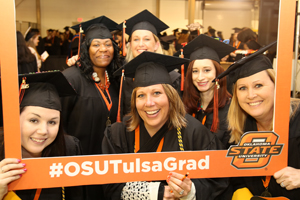New Special Education Cohort Celebrates First Graduation
Friday, November 6, 2015
Oklahoma State University College of Education is stepping up as a teacher shortage, particularly in special education, challenges Oklahoma schools.
The state legislature opened the door for certification changes for special education teachers, and the first cohort of special education non-traditional students graduated in the spring of 2015.
The cohort is made up of career changers. The program increased the number of OSU
special education graduates to about 15, easily double the typical number of special
education graduates, says Kimberly Davis, assistant professor and special education
program coordinator.
“We are very excited for this group,” says Davis. “They have really persevered. They had an interest but didn’t think they could do it. The new legislation opened the door where they thought before it wasn’t an option.”
House Bill 1233, signed into law in May 2013, provides potential special education teachers a non- traditional route for teacher certification. Candidates for the non-traditional route must hold a four-year degree and commit to completing a Master’s Degree or certification in Special Education. Candidates may apply for a provisional teaching certificate after successfully completing a 150-hour program (boot camp) and work as certified special education teachers. Candidates have three years to complete their master’s degree or certification program.
Oklahoma State University provides the boot camp each Spring by instructing three specific courses to prepare these non-traditional students.
“Legislation made it possible for people without an education degree to become provisionally certified as special education teachers,” Davis says. “These courses have always been on the books, but we set it up like a ‘boot camp’, that is specifically for these types of students.”
This first cohort began in the spring of 2014. OSU starts cohorts in the spring to give students more time and coursework before they go into the classroom, Davis says.
Through OSU-Tulsa, students enroll in three classes per semester with two held back-to-back on Wednesdays from 4-10 p.m. The third course is held on Saturdays, meeting three times a month. The rest is online.
“This new opportunity has given career changers who may have been in human resources or accounting and now want to teach special education the opportunity to do that,” Davis says.
Not only is the OSU program a ‘fast track’ to get students into the classroom, it’s quality is recognized and praised.
“I have had a great experience with the program. I was able to go through the first three courses with ease and that helped me pass the OGET [Oklahoma General Education Test] and the mild/moderate subject tests,” says Kerri Moffitt, a special education teacher in her second year at Stillwater Junior High. “The professors have been so helpful and are so willing to answer any questions.”
While earning a master of science in Teaching, Learning and Leadership with a special education option, students in the program were able to accept jobs in Oklahoma schools after their first three courses were complete and they passed the certification exam.
“Most [students in the program] were teaching by this past fall. They received provisional certification that included OSU sending a letter stating they took the preliminary coursework and students take the mild/moderate test. They take that early in the program so that they can get started in the classroom,” Davis explained.
The first classes are “Characteristics of students with mild/moderate disabilities”, “Planning and instruction for students with disabilities”, and “Behavior management”.
“My experience in the program has been overwhelmingly positive. I cannot sing the praises of Dr. Davis and Dr. (Penny) Cantley enough for both their excellent instruction and professional guidance. The program feels very personal and you really get to know your professors and advisor, which has been a fantastic experience,” said Lisa Suurmeyer, special education assistant at Remington Elementary in Tulsa.
“Before starting the program I thought I was going to be the odd man out by being
the oldest but quickly found myself to be wrong. This program was geared for working
adults who wanted to pursue education on a non-traditional path,” Moffitt said. “It's
been wonderful and I've met some great friends who I will continue to collaborate
with for a lifetime.”
Learn more about the College of Education's Special Education program and alternative certification options here.

